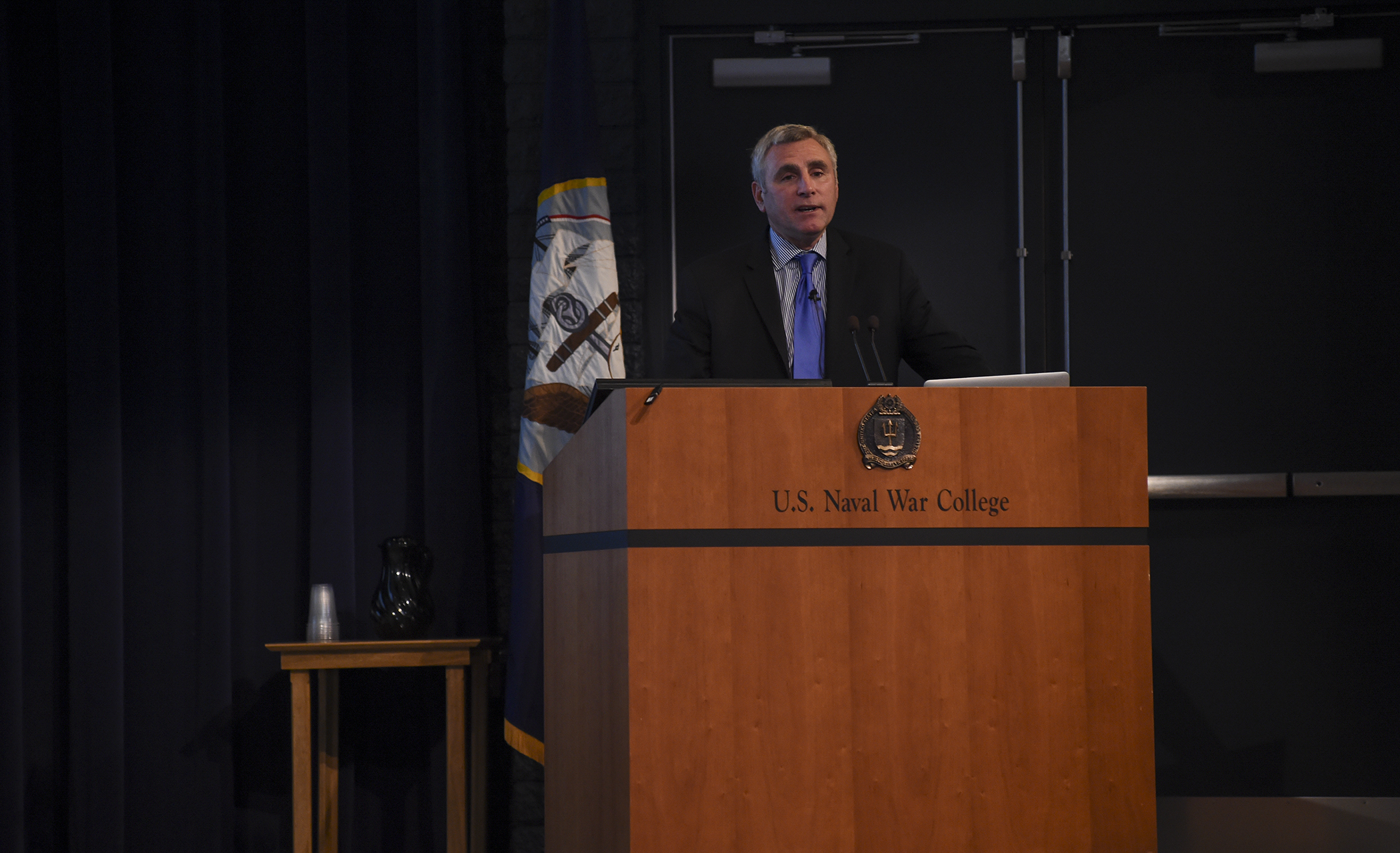New Naval War College tech symposium supports CNO’s Design

NEWPORT, R.I. – U.S. Naval War College (NWC) held its inaugural Future Warfighting Symposium last week for students, faculty and staff in Spruance Auditorium at the Newport, Rhode Island school.
The symposium directly supported the CNO’s call for increased education on emerging topics with a goal of making students more aware of the future of security, according to Cmdr. Michael O’Hara, director of the symposium.
“The CNO charged Naval War College to increase its curriculum in three areas -- emerging technologies, cyber warfare, and space operations. This symposium is a direct response to that request.
And it is in line with the CNO’s design,” said O’Hara, professor in Strategy and Policy.”
Earlier this year, the CNO outlined priorities for the service in two published documents, Design for Maintaining Maritime Superiority and Future Navy.
In opening remarks to the group, the president of the school asked that students seriously consider the topics that are a high priority for the CNO.
“The CNO challenged each of us, and he challenges each of you, to ready for the challenge that is coming, to ensure your lethality, to enhance your readiness. This week’s Future Warfighting Symposium responds directly to that challenge. This event supports the CNO’s Design for Maintaining Maritime Superiority and Future Navy documents,” said President, NWC, Rear Adm. Jeffrey Harley.
“From the outset [of the academic year], I want you to be thinking innovatively and strategically about capabilities and threats in space, the global information grid, and emerging technologies such as nanotechnologies, biological agents, robotics and artificial intelligence,” he said. “And as you do, I also want you to think historically. I want you to read deeply the theory and history of war and question in what ways the character of war you have experienced in your own career is similar to that of leaders such as Pershing, Sims, Nimitz, LeMay, or Mattis. And as you contemplate the technologies of the 21st Century, consider what continuities exist and what discontinuities demand new strategies for victory.”
One of the presenters, offered personal perspectives on the critical importance of United States’ international partners to NASA’s Journey to Mars.”
“NASA is one of the nation’s greatest providers of soft power in our relations around the world,” said former NASA Administrator Charles Bolden, a retired major general.
Bolden also highlighted the agency’s robust international relations program with particular emphasis on ongoing relations with major partners: the Russian Space Agency, the European Space Agency, the Japan Aerospace Exploration Agency, the Indian Space Research Organization and the China National Space Administration.
All of the nearly 500 students taking the master’s level courses at the school are taking part in the Future Warfighting Symposium which launched Naval War College’s academic year and convened subject-matter experts to enrich the existing curriculum and to provide resources to students and faculty. Two additional sessions will be held at the end of the fall trimester and the spring trimester.
NWC students come from all branches of the military, federal agencies and international militaries.
“One of the most important outcomes of this symposium is for our students to think more broadly and innovatively about operational and strategic levels of war,” added O’Hara.
The time is right for innovations in security, according another event speaker.
“For generations, the United States military has been relatively unchallenged in the space domain,” said Richard Dalbello, vice president of Virgin Galactic. “Today, there is a realizable threat from space forces from other countries. New space companies and technologies will bring agile, innovative, and affordable solutions to meet future military space needs. Commercially available satellites and launch vehicles will soon provide a low-cost, rapid-response surge capability to maintain U.S. Air Force space superiority during contested, degraded, and operationally limited environments.”
As a way to gauge incoming students’ awareness of the CNO’s documents, organizers of the symposium partnered with the school’s Writing Center.
Each student has historically provided a writing inventory as they matriculate as a means to identify their level of scholarly writing. As part of the symposium efforts this year, the center specifically asked students to focus their essays on the CNO’s recently published documents.
This allowed students to get familiar with the CNO’s documents while giving symposium leaders an opportunity to assess what students’ level of understanding on the topic.
